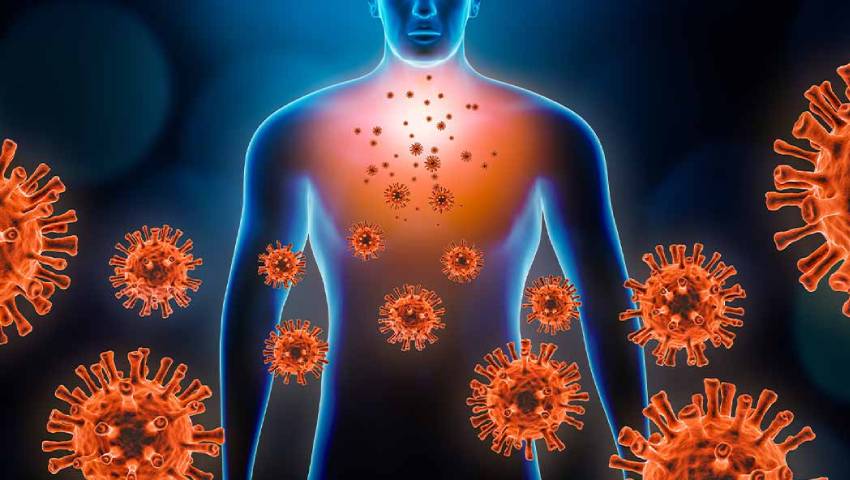
- 25/09/2024
- Dr. Pratik Patil
- 0 Comments
- Blog
Does Inflammation Cause Cancer?
Can cancer be caused by inflammation? Inflammation is your body’s natural way of healing from injuries or fighting off infections. But what happens when this defense mechanism becomes chronic, lasting for weeks, months, or even years? Research shows that long-term inflammation can play a significant role in the development of various diseases, including cancer. In this blog, we’ll explore the connection between chronic inflammation and cancer, and how ongoing inflammation might increase the risk of cancerous growth. With insights from Dr. Pratik Patil, a renowned cancer specialist in Pune, we’ll guide you through understanding this link and discuss effective strategies to reduce your cancer risk by managing inflammation.
Understanding Inflammation:
Inflammation is the body’s response to injury, infection, or harmful substances. It typically involves redness, swelling, heat, and pain. There are two types of inflammation:
- Acute Inflammation: Short-term inflammation that resolves once the body heals. It’s a protective response.
- Chronic Inflammation: Long-lasting inflammation lasts even when there is no injury or no infection develops. This kind of disease is dangerous and is related to different health issues, among which is cancer.
The Link Between Chronic Inflammation and Cancer:
Chronic inflammation has been associated with cancer because it can damage DNA and promote cell mutations. Over time, this damage may cause cells to grow uncontrollably, leading to tumor formation. According to Dr. Pratik Patil, certain types of cancer, like colon, liver, and stomach cancers, have been closely linked to chronic inflammation.
Some common conditions associated with chronic inflammation and increased cancer risk include:
- Chronic Infections: Viral infections like Hepatitis B and C (linked to liver cancer), and Helicobacter pylori (linked to stomach cancer) are examples where long-term inflammation increases cancer risk.
- Autoimmune Diseases: Conditions like Crohn’s disease and ulcerative colitis cause chronic inflammation in the gut, increasing the risk of colorectal cancer.
- Obesity: Excess body fat can lead to chronic low-level inflammation, which may increase the risk of breast, colorectal, and other cancers.
How Does Chronic Inflammation Cause Cancer?
Chronic inflammation causes ongoing tissue damage, which may lead to DNA mutations over time. These mutations can trigger abnormal cell growth, one of the main pathways to cancer development.
- Cellular Damage: Chronic inflammation constantly attacks healthy cells, which can lead to mutations in their DNA. These mutations can cause cells to multiply uncontrollably, forming tumors.
- Immune System Overload: When inflammation is prolonged, the immune system becomes overactive and releases chemicals that can promote cancer growth instead of fighting it.
- Tumor Promotion: Inflammatory molecules like cytokines and chemokines can stimulate the growth of cancerous cells. Chronic inflammation can also support blood vessel growth (angiogenesis), helping tumors get the nutrients they need to grow.
Types of Cancers Linked to Chronic Inflammation:
- Colorectal Cancer: People with chronic inflammatory conditions of the colon, such as Crohn’s disease or ulcerative colitis, have a higher risk of developing colorectal cancer.
- Lung Cancer: Long-term exposure to harmful substances like cigarette smoke can cause chronic lung inflammation, which is linked to lung cancer.
- Liver Cancer: Chronic hepatitis infections (B or C) can lead to long-term inflammation in the liver, increasing the risk of liver cancer.
- Stomach Cancer: Helicobacter pylori, a bacteria causing chronic inflammation in the stomach lining, is associated with stomach cancer.
- Pancreatic Cancer: Chronic pancreatitis increases the risk of pancreatic cancer.
Can Reducing Inflammation Lower Cancer Risk?
According to Dr. Pratik Patil, reducing chronic inflammation could help lower cancer risk. Here are some effective strategies:
- Adopt an Anti-Inflammatory Diet: A diet rich in fruits, vegetables, whole grains, and healthy fats (like omega-3) can help reduce inflammation. Avoid processed foods, sugary drinks, and excessive red meat, which can promote inflammation.
- Exercise Regularly: Physical activity helps reduce chronic inflammation by improving immune function and controlling weight.
- Manage Stress: cognitive chronic stress may manifest in aggravating inflammation. Techniques like yoga, meditation, and breath control through yoga deep breathing have been shown to successfully help with stress inflammation.
- Avoid Inflammatory Triggers: Chronic inflammation may arise from smoking, heavy drinking, or even being subjected to risky chemicals (such as pollution or at work). Still, it is conceivable to quit smoking and cut down on drinking a little which will have good results on the obesity inflammation loss problem.
- Control Chronic Conditions: When a chronic illness such as diabetes or autoimmune disease is in the image, such treatment of the disease that is well done actually will not only help the utilization of oxygen p in the healthy tissues but also the decreased cancerous cells.
Conclusion:
Chronic inflammation can increase cancer risk by causing DNA damage and promoting harmful cell changes. While not every case of inflammation leads to cancer, long-term, untreated inflammation is a significant risk factor. To lower this risk, consider adopting an anti-inflammatory diet, staying active, and managing stress effectively.
If you’re concerned about inflammation, or your cancer risk, or need a second opinion on your health, Dr. Pratik Patil, the best oncologist in Pune is here to help. With his extensive experience in treating various cancers, he offers personalized treatment plans and expert care tailored to your needs. For more information or to book an appointment, consult Dr. Pratik Patil, a leading cancer specialist in Pune.
